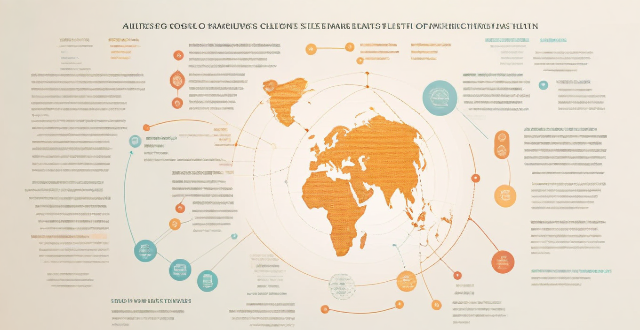The Paris Agreement, adopted in 2015, aims to limit global warming and represents a unified effort by countries worldwide to address climate change. Key features include long-term goals, nationally determined contributions (NDCs), adaptation measures, loss and damage mechanisms, financial support, and transparency frameworks. The agreement has impacted climate governance by promoting global cooperation, enhancing political commitment, providing flexibility in NDCs, establishing financial mechanisms, ensuring transparency, recognizing loss and damage, integrating policies, involving the private sector, and raising public awareness. Despite implementation challenges, the Paris Agreement has set the stage for concerted action on climate change.

The Paris Agreement and Its Impact on Climate Governance
The Paris Agreement is a global climate change agreement adopted by 196 parties at the United Nations Framework Convention on Climate Change (UNFCCC) Conference of the Parties (COP) in Paris on December 12, 2015. The main goal of the Paris Agreement is to limit global warming to well below 2°C above pre-industrial levels and to pursue efforts to limit the temperature increase to 1.5°C. This agreement has had a significant impact on climate governance, as it represents a collective effort by countries around the world to address the urgent issue of climate change.
Key Features of the Paris Agreement
- Long-term Goal: To hold the increase in the global average temperature to well below 2°C above pre-industrial levels and to pursue efforts to limit the temperature increase to 1.5°C.
- Mitigation: Each party commits to implementing and periodically updating its own nationally determined contribution (NDC) towards mitigating greenhouse gas emissions.
- Adaptation: Recognizes the importance of adaptation measures to address the impacts of climate change.
- Loss and Damage: Establishes a mechanism to address loss and damage associated with the impacts of climate change that cannot be avoided through mitigation or adaptation.
- Finance: Encourages developed countries to provide financial support to developing countries for both mitigation and adaptation efforts.
- Transparency: Includes a transparency framework to ensure that countries are accountable for their NDCs and progress towards meeting their targets.
Impact on Climate Governance
Global Cooperation and Commitment
- Collective Action: The Paris Agreement represents a unified global response to the threat of climate change, bringing together countries with diverse economic, political, and environmental interests.
- Political Commitment: It has strengthened political commitment among nations to take action on climate change, setting a clear goal and timeline for reducing greenhouse gas emissions.
Nationally Determined Contributions (NDCs)
- Flexibility: Allows each country to set its own targets based on its national circumstances, providing flexibility while ensuring that all countries contribute to the global effort.
- Progressive Enhancement: Countries are expected to regularly review and update their NDCs, ensuring that ambition increases over time.
Finance and Support for Developing Countries
- Financial Mechanisms: Establishes channels for developed countries to provide financial resources and support for developing countries, facilitating their participation in climate action.
- Capacity Building: Emphasizes the need for capacity building in developing countries to enhance their ability to implement and benefit from climate actions.
Transparency and Accountability
- Reporting and Review: Introduces a transparency framework where countries report on their greenhouse gas emissions and implementation of their NDCs, subject to a technical expert review.
- Facilitative Dialogue: Promotes constructive dialogue among parties during the review process, focusing on sharing experiences and identifying areas for improvement rather than penalizing non-compliance.
Loss and Damage Mechanism
- Recognition: Acknowledges that some impacts of climate change cannot be avoided or addressed through adaptation alone, necessitating a mechanism to deal with loss and damage.
- Implementation Challenges: While establishing the principle of addressing loss and damage, practical implementation remains challenging due to issues related to funding, liability, and compensation.
Integration into National Policies and Strategies
- Policy Coherence: Encourages countries to integrate climate considerations into their broader development policies and strategies, promoting coherence between climate action and other policy areas such as energy, transport, and agriculture.
Private Sector Involvement and Innovation
- Market Signals: By setting a clear long-term goal, the Paris Agreement provides market signals that can stimulate private sector investment in low-carbon technologies and sustainable practices.
- Innovation Driven: Fosters an environment conducive to innovation in clean technologies and sustainable solutions, driving down costs and increasing accessibility.
Public Awareness and Participation
- Raised Awareness: The high-profile nature of the Paris Agreement has contributed to increased public awareness about climate change and its implications.
- Civil Society Engagement: Encourages involvement from civil society organizations, enhancing the diversity of perspectives and solutions in climate governance.
Conclusion
The Paris Agreement marks a significant milestone in global climate governance by establishing a universal framework for collaborative action on climate change. Its impact is evident in the enhanced political commitment, the adoption of nationally determined contributions, the emphasis on transparency and accountability, and the recognition of the need for finance and support for developing countries. While challenges remain in achieving the goals set forth in the agreement, the Paris Agreement has undoubtedly laid the groundwork for a more concerted effort to address one of the most pressing global issues of our time.